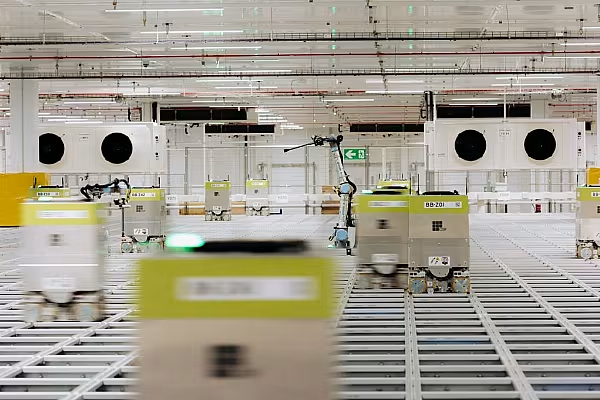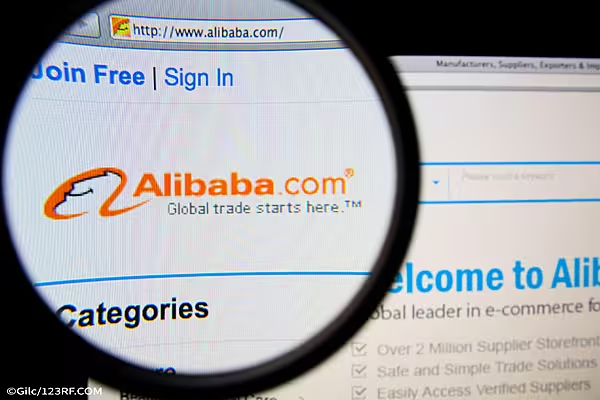Alibaba and Tencent can count themselves among the world’s costliest technology companies after a stellar run. To justify those lofty valuations, China’s two largest corporations have to deliver on some of the riskiest bets they’ve placed in years.
Alibaba Group, which created China’s largest online bazaar but has scant brick-and-mortar experience, spent $8 billion investing in a string of retailers including Suning Commerce Group Co. to prove it can transform old-school shopping. Tencent Holdings is extending a gaming empire built around social phenomenon WeChat, buying studios and creating content to evolve into an entertainment powerhouse. Those multibillion-dollar bets come under the microscope when both report earnings this week.
The aim is to sustain the sort of growth that’s driven their share multiples in excess of Facebook, Apple, or Google parent Alphabet - members of the vaunted FAANG quintet that also includes Amazon and Netflix.
Quarterly Results
Alibaba and Tencent are projected to report June-quarter profit growth of 36% and 25% respectively. While investors have so far given them the benefit of the doubt based on their track records, the fact that projections for share gains are rising faster than for actual earnings signals an impending market pullback, warns Neil Campling at Northern Trust Capital Markets.
After rising 73% in 2017, Alibaba shares trade at a multiple of 64 times earnings. Tencent is trading at 56 times profit after a 71% rise in its stock. That’s almost twice Alphabet’s 30 times and well ahead of Facebook’s 38. And Tencent’s shares this month surpassed projections on its stock price for the first time since 2015.
“The digital scale platform titans, such as Tencent, Alibaba and Facebook deserve premium ratings, but they will need to ‘grow’ into such ratings rather than skyrocket higher,” Campling wrote in a report to clients. He highlighted the gulf between projections on prices versus earnings. “For those stocks where there is a significant gap between the two metrics we wonder if we may see some pressure on stock prices in the short term.”
The scale of Alibaba and Tencent’s acquisitions and deals - a total of $55 billion announced or completed in 2016 and 2017 - had initially taken investors by surprise, given their years-long conservative streak of minority stakes. They’re motivated in part by the driving need to remain at the forefront: as Alphabet chairman Eric Schmidt put it, competitors in the internet industry may be just one click away.
HeMa Supermarkets
Of the two, Alibaba’s moves seem more out-of-left-field. It began buying grocers from Lianhua to Sanjiang well before Amazon agreed to buy Whole Foods Market. Apart from acquisitions, China’s largest e-commerce player is also investing an unknown amount in initiatives rooted in physical retail, because co-founder Jack Ma believes pure e-commerce operators face “ tremendous challenges” in future.
Take HeMa Supermarkets, the first of an envisioned nationwide chain that’s a grocery, restaurant and digital payments showcase rolled into one. Shoppers can dine in on fresh produce from lobster to crab, browse product recommendations by scanning bar codes throughout the store, then pay for everything through the Alipay app. Each store will eventually double as fulfilment centres, with staff picking up and shipping goods ordered online - the goal being to deliver in under half-an-hour to anywhere within a three-mile radius.
HeMa could expand to 22 stores by the end of 2018 from 13 as of June, generating 2.5 billion yuan in revenue, Barclays Plc analysts led by Gregory Zhao estimate. But supermarkets are just the tip of the iceberg - Alibaba wants to overhaul all retail, and not just for China either. The company has said so-called big-data analysis twinned with internet-based cloud technology can fundamentally change the way brands manage inventory to meet real-time demand. Multiple layers of middlemen could be rendered redundant, Chief Executive Officer Daniel Zhang said in October.
“While core commerce is the engine for Alibaba’s near-term growth, new retail is expected to shape Alibaba’s business model in the long run,” Zhao said in a report.
Gaming Investment
Arch-foe Tencent is betting on initiatives closer to home, though no less ambitious. In the social media giant’s case, its mobile hit Honour of Kings and under-developed WeChat advertising business are fuelling investors’ confidence.
Honour of Kings, an in-house adaptation of the better-known slugfest League of Legends, could generate $3 billion of revenue this year, according to Serkan Toto, the founder of Tokyo-based consultancy Kantan Games Inc. Its runaway success has proven Tencent’s mainly desktop-based gaming business can make a successful transition to mobile and demonstrated the competence of its own team, after having led the $8.6 billion acquisition of Clash of Clans studio Supercell Oy and, before that, Riot Games Inc.
But the Shenzhen-based company is also trying to reduce its reliance on games by making more money from WeChat via ads. Online advertising accounted for 13.9% of its revenue in the March quarter. Compare that with Facebook’s 98% reliance on ads in the same period.
Tencent reports its quarterly numbers on Wednesday, a day before Alibaba posts its results in the US. The investors who’ve rewarded the pair can then decide if their rich valuations are deserved, especially in a country where the government can change the business landscape with little notice.
“While gaming and advertising at Tencent are healthy, investors’ anticipation for earnings in cloud, payments and all the other new businesses can’t be substantiated by financial models,” said Li Muzhi, a Hong Kong-based analyst at Arete Research Services LLP. “Both companies face certain political risks.”
News by Bloomberg. Click subscribe to sign up to ESM: The European Supermarket Magazine.














